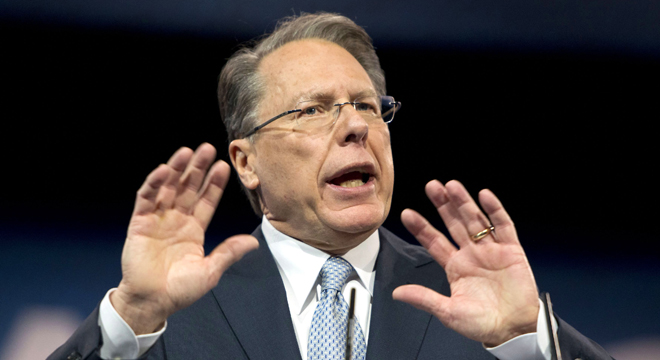There’s no defense quite like a good offense. But this one relies on a falsehood.
The National Rifle Association, under fire in many quarters for scuttling popular legislation to require near-universal background checks for gun purchases, is embarking on a new campaign to prove that it cares about preventing future shootings. The group is talking up the need to keep firearms away from mentally ill people — a cause that it frequently invokes.
The gun lobby organization is putting out a print ad lamenting that mental health reform is “being held hostage” — the three words are creatively splayed out to look like a hostage note — by President Obama and Democrats. Reported this week by the Washington Examiner, the group intends to spend $55,000 on the ad campaign.

“Both parties agree that we need to reform our broken mental health system to prevent mass shootings,” the NRA ad reads. “But President Obama and Senate Majority Leader Reid are holding it hostage to their divisive and failed gun control agenda. It’s time for the White House and Senate to end gridlock and move forward on mental health reform.” (Here’s the ad at left.)
A compelling message — from a strange messenger. It’s not merely that a bill the NRA helped kill in April would have closed loopholes through which criminals and mentally ill people can currently buy guns without a background check. It’s also that the NRA-backed substitute legislation, which also failed in the Senate, would have made it easier for people with a history of severe mental illness to buy firearms.
Specifically, the NRA supported a bill offered by Sens. Chuck Grassley (R-IA) and Ted Cruz (R-TX) that would have let people who have been involuntarily committed to psychiatric hospitals buy guns immediately after their commitment order expired.
Under the Grassley-Cruz bill, “[p]eople recently hospitalized and still recovering from a mental health crisis could go directly from the hospital to a gun store — and legally buy a firearm,” explained a trio of mental health law and policy experts in the D.C. newspaper The Hill. “Guns that were seized at the time of hospitalization would have to be returned.”
The three professors — Columbia University’s Paul Appelbaum, University of Virginia’s Richard Bonnie and Duke University’s Jeffrey Swanson — argued that this would be dangerous. “The expiration of an involuntary commitment order is often just the starting point in a person’s ongoing recovery from an acute episode of a mental disorder,” they wrote. “Indeed, attempts at suicide and other acts of violence following hospitalization are most likely to occur shortly after discharge, with the risk diminishing over time.”
The NRA-backed Grassley-Cruz legislation would also have restored gun rights for people who “have been adjudicated mentally incompetent” to enter into contracts. And although its supporters say it enhanced resources and incentives to improve mental health reporting, it would ultimately have cut funding for the background check system by about $105 million.
“The NRA is at the point of shamelessness where they hand legislative language to Senators and say they can help get more mentally ill people into the system, when Grassley-Cruz would in fact do precisely the opposite,” said Mark Glaze, the executive director of Mayors Against Illegal Guns, the group led by Michael Bloomberg. “[T]he NRA has spent a generation making sure anyone can buy any gun and carry it anywhere — including felons and the seriously mentally ill.”
Reached by TPM, NRA spokesman Andrew Arulanandam defended the Grassley-Cruz bill, arguing that the professors’ concerns aren’t likely to bear out because judges can simply modify a recovering mentally ill person’s status as outpatient and keep them on the prohibited list.
“The problem with their argument,” he said in an email, “is that in the real world a person who is in the midst of an ongoing recovery process probably won’t be (and definitely shouldn’t be) suddenly released from inpatient treatment with no mandatory follow-up at all.”
Arulanandam said the NRA ad’s claim that “[n]inety-five Senators have voted for meaningful mental health reform” was a reference to an amendment offered by Sens. Tom Harkin (D-IA) and Lamar Alexander (R-TN). It’s a modest bill to renew current anti-suicide programs, enhance mental health care and intervention in schools and study the issue more closely. Indeed, it passed 95-2, but never became law because Democrats pulled the base legislation after the failure of the background checks proposal — which Reid vows to bring back.
The Harkin-Alexander bill amounted to little more than a drop in the bucket when it comes to keeping guns away from dangerous members of society. The more consequential efforts have repeatedly been thwarted by the powerful gun lobby.






